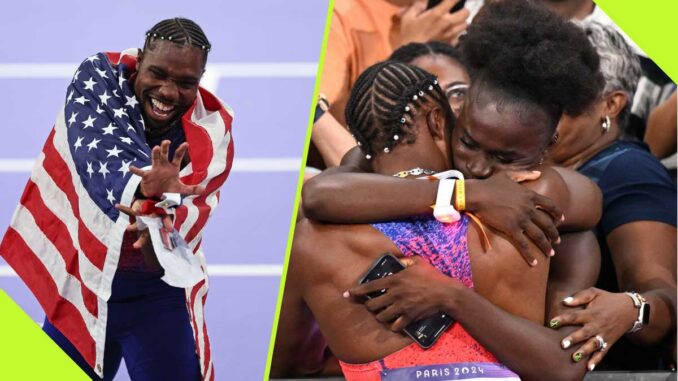
Noah Lyles, the reigning sprint king and one of track and field’s most electrifying figures, is celebrated today for his confidence, charisma, and unmatched speed on the global stage. Yet behind the bright lights of world championships and Olympic podiums lies a journey marked by obstacles many never saw. Recently, Lyles opened up about his childhood, revealing how asthma and dyslexia shaped not just his athletic career, but also his resilience and outlook on life.
In a candid reflection, the 27-year-old American sprinter admitted that “confidence was not my thing” while growing up. For a child who would one day become a household name in athletics, those words seem almost unimaginable. But Lyles explained that his early years were riddled with physical and educational challenges that left him questioning his abilities.
Asthma was his first hurdle. As a young boy, Lyles frequently found himself struggling for breath, forced to navigate the limitations of a condition that can feel especially cruel to a child with big athletic dreams. Running, which today seems so natural for him, once came with a heightened awareness of every gasp of air. He described how asthma often kept him sidelined, watching others play freely while he managed his condition with inhalers and frequent trips to the doctor. That reality might have discouraged many, but for Lyles, it planted an early seed of determination.
On top of that, Lyles battled dyslexia, a learning difference that made reading and schoolwork unusually challenging. While his peers seemed to progress smoothly, he often felt left behind, struggling to process words and assignments with the same ease. Dyslexia, as Lyles admitted, was not just an academic struggle—it was an emotional one. The stigma of being “different” in the classroom made him self-conscious, further eroding his confidence. “It made me feel like I wasn’t enough,” he has shared in past interviews.
Yet it was in these difficulties that the foundation of Lyles’ resilience began to form. Sports became his outlet, a place where his struggles did not define him. On the track, there were no books to decode or reading tests to stumble through. It was just him, his speed, and the finish line. Even as asthma and self-doubt trailed him, the track became a sanctuary where he could express himself fully.
Support from his family also played a crucial role. His mother and brother, Josephus—who also pursued sprinting—provided both encouragement and a reminder that his struggles were not insurmountable. With their belief in him, Lyles learned that setbacks did not have to dictate the future. Slowly, he began to build confidence not from instant success, but from persistence and incremental growth.
Today, the world sees Noah Lyles as bold, outspoken, and supremely self-assured. But understanding his past struggles makes his present shine even brighter. His story offers hope for young people grappling with similar challenges—whether physical, academic, or emotional. It proves that greatness is not born in the absence of hardship, but in the courage to push through it.
As Lyles continues to etch his name alongside legends of track and field, his openness about asthma and dyslexia adds a powerful layer to his legacy. More than just a champion sprinter, he has become a champion of resilience, showing the world that struggles do not define you—they refine you.
Be the first to comment